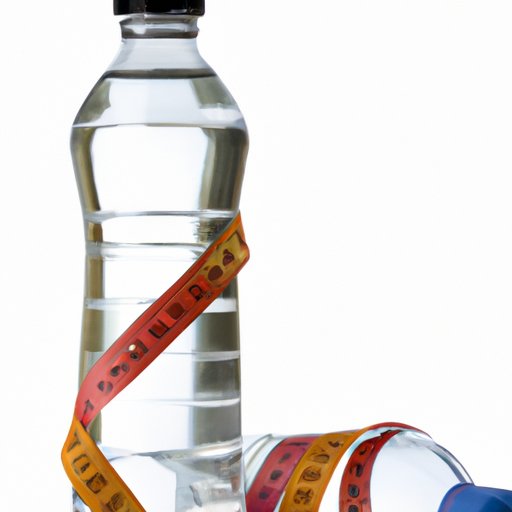
Introduction
Water weight gain, also known as fluid retention, is a common occurrence among many individuals. It refers to the excess fluid that is stored in the body’s tissues, causing swelling and bloating. It is essential to differentiate water weight gain from fat gain, as it is the former that can be reversed relatively quickly. This article seeks to provide a beginner’s guide to understanding water weight gain, debunking myths about water weight gain, outlining the role of sodium, highlighting the importance of hydration and discussing diuretics.
Understanding Water Weight Gain: A Beginner’s Guide
Water weight gain can be influenced by several factors, including factors such as changes in hormone levels, medications, dehydration, and poor diet. When it comes to how much weight someone can expect to gain from water, it can range from one to several pounds within a day.
Changing your diet and exercise pattern can lead to temporary weight gain, but reducing sodium intake and proper hydration can help in preventing continued water weight gain. Hormonal changes can also influence water weight gain, such as during menstruation or menopause.
Debunking Myths About Water Weight Gain
There are several myths about water weight gain, such as that drinking more water leads to water weight gain. This claim is entirely unfounded and lacks evidence. Drinking plenty of water is beneficial for overall health, including preventing dehydration and providing energy during exercise.
Another myth is that avoiding all salty foods is necessary to maintain a healthy weight. While it is crucial to lower your sodium intake, avoiding salty foods altogether is unnecessary. Additionally, it is vital to note that it is not only salty foods that are associated with fluid retention but rather an overabundance of salt.
The Impact of Sodium on Water Weight Gain
The relationship between sodium and water weight gain is well documented, as sodium plays a crucial role in fluid balance. Sodium can increase water retention by prompting the body to hold onto more water to balance out its levels.
To reduce the risk of excessive water weight gain, it is advised to avoid high-sodium foods and reduce your sodium intake to around 2,300 milligrams per day. For people above the age of 50 and those with underlying health conditions, the recommended sodium intake is 1,500 milligrams per day.
How Hydration Affects Water Weight Gain
Proper hydration is critical in balancing water intake, fluid distribution, and electrolyte balance to avoid water weight gain. Drinking adequate amounts of water, along with other fluids, not only helps in eliminating excess sodium, but also improves digestion and optimizes metabolic functions.
It is essential to note, however, that overhydration can lead to increased water weight gain and affect the body’s electrolyte balance. Therefore, it is essential to strike a balance with water intake while also considering factors such as climate and level of activity.
Diuretics: A Solution for Water Weight Gain?
Diuretics are medications that increase urine production, helping to expel excess fluids from the body. These medications can be useful in treating conditions such as edema and high blood pressure.
While diuretics can aid in combating water weight gain, they come with risks and side effects, including dehydration, nutrient imbalances, and interactions with other medications. Therefore, it is essential to seek medical advice before using diuretics.
Managing Water Weight Gain: Tips and Tricks
Several strategies can be used to minimize water weight gain, such as avoiding high-sodium foods, reducing alcohol intake, and maintaining a balanced level of water intake.
It is also essential to identify and address underlying health conditions contributing to water retention, such as kidney or liver disease. Additionally, practicing stress relief techniques such as meditation, massage, and exercise can help in managing water weight gain.
Conclusion
Water weight gain can be frustrating, but understanding the factors contributing to it and adopting appropriate strategies can help in managing and minimizing it. Adequate hydration, proper diet, reducing sodium intake, and avoiding high-sodium foods can play a crucial role in maintaining a healthy weight and preventing the effects of water weight gain. Speak to your doctor if you’re experiencing sudden water weight gain.




